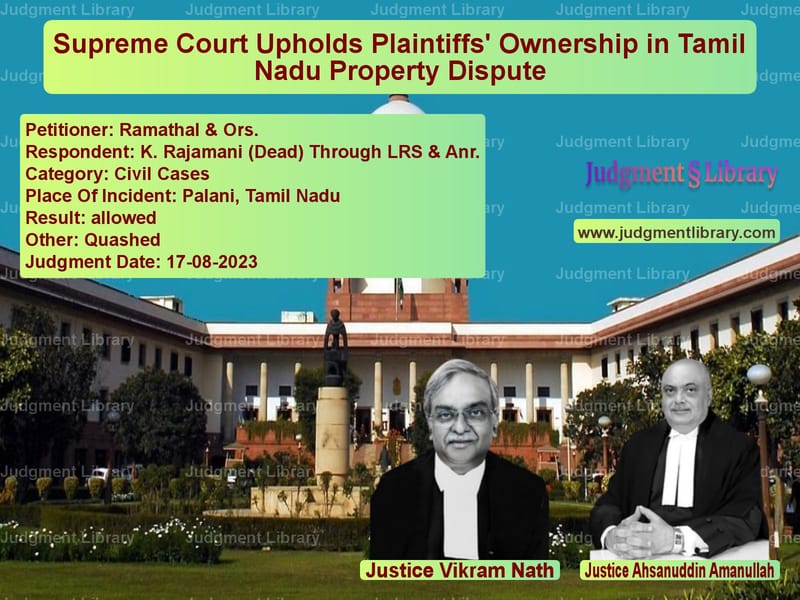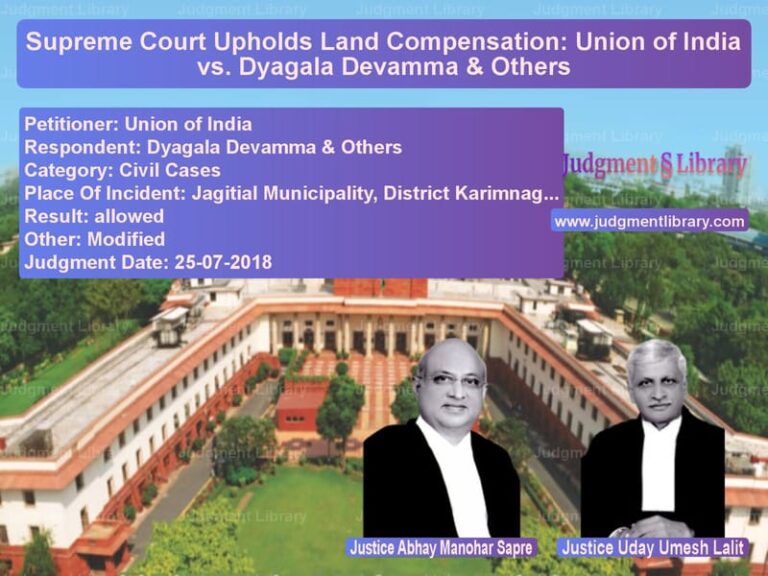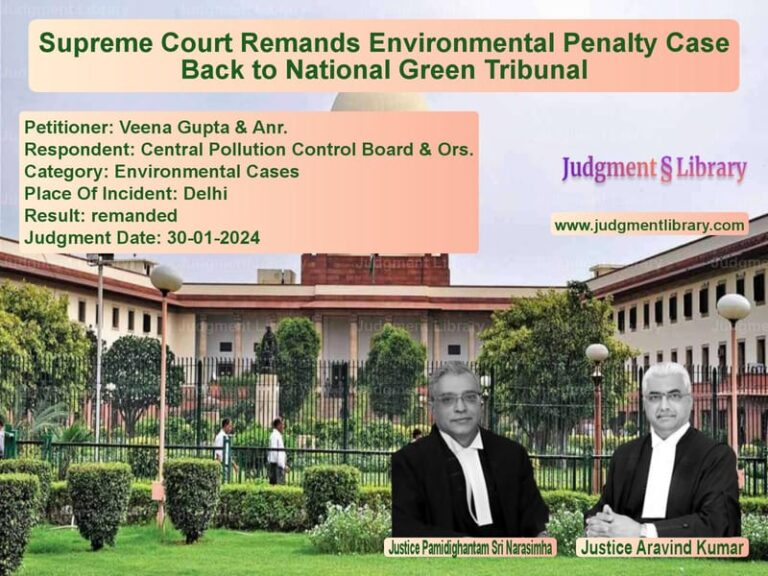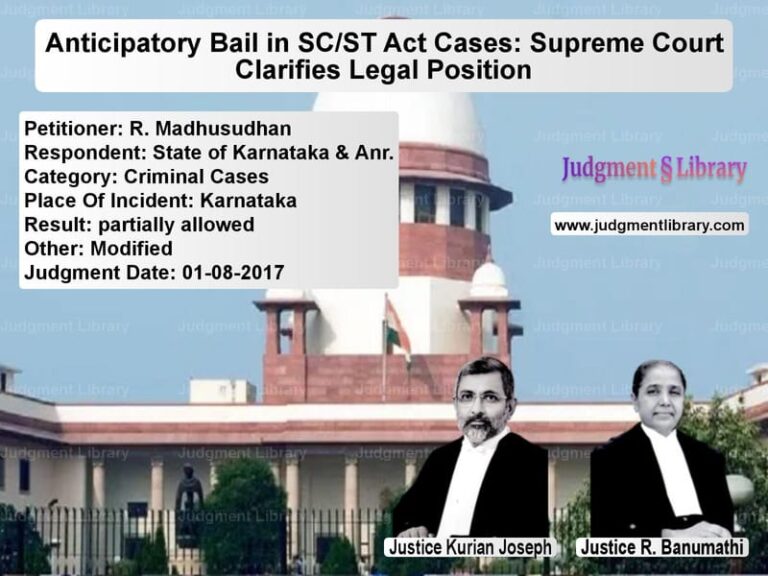Supreme Court Upholds Plaintiffs’ Ownership in Tamil Nadu Property Dispute
The Supreme Court of India in the case of Ramathal & Ors. v. K. Rajamani (Dead) Through LRS & Anr. delivered a significant judgment, settling a long-standing property dispute in Tamil Nadu. The case revolved around the legality of a power of attorney and the alleged fraudulent sale of land by the attorney-in-fact, leading to a legal battle spanning multiple decades. The Court ultimately ruled in favor of the plaintiffs, restoring their ownership rights over the disputed land.
Background of the Case
The dispute concerned 110 cents of land located in East Ayakudi Village, Palani, Tamil Nadu. The land originally belonged to the first plaintiff, Natchimuthu, who executed a gift deed in favor of his first wife, Ramathal, for 50 cents of the property. The plaintiffs, being illiterate and financially dependent, entrusted the development of their land to a local resident, Rajamani, through a registered power of attorney.
The timeline of the case is as follows:
- September 5, 1986: Plaintiffs executed a power of attorney in favor of Rajamani to develop and sell plots.
- September 19, 1986: Rajamani registered the power of attorney and immediately executed two sale deeds—one in favor of his father and another in favor of his younger brother.
- 1988: Plaintiffs discovered the fraudulent sale and attempted to take legal action.
- April 25, 1991: Plaintiffs obtained a certified copy of the power of attorney and learned about the unauthorized clauses allowing the sale of land.
- October 1991: Plaintiffs filed a civil suit for ownership declaration and permanent injunction.
- January 6, 1998: The trial court dismissed the suit, holding the power of attorney to be valid.
- February 13, 2002: The first appellate court reversed the trial court’s decision, declaring the sale fraudulent.
- November 21, 2008: The Madras High Court overturned the appellate court’s ruling, restoring the trial court’s order.
- August 17, 2023: The Supreme Court reinstated the first appellate court’s decision, ruling in favor of the plaintiffs.
Key Legal Issues Considered
- Whether the power of attorney granted Rajamani the authority to sell the land.
- Whether the plaintiffs had been defrauded due to their illiteracy and lack of understanding of the document.
- Whether the sale was void due to misrepresentation and lack of consent.
- Whether the High Court exceeded its jurisdiction in interfering with the first appellate court’s findings.
Arguments by the Plaintiffs
The plaintiffs argued:
- The power of attorney was meant only for developing the land, not for selling it.
- Rajamani fraudulently inserted additional clauses giving him authority to sell the property.
- The sale transactions were undervalued, and possession was never transferred.
- As illiterate villagers, they had no means to detect the fraud until much later.
- The appellate court correctly held that the transactions were fraudulent, and the High Court erred in reversing the decision.
Arguments by the Defendants
The respondents (Rajamani’s legal heirs) contended:
- The power of attorney was duly executed and registered.
- The plaintiffs accepted the sale consideration, and possession was handed over.
- The delay in filing the suit (three years after discovering the fraud) weakened their claim.
- The trial court rightly upheld the power of attorney’s validity, and the appellate court had no reason to interfere.
Supreme Court’s Analysis and Judgment
1. Fraud and Misrepresentation in the Power of Attorney
The Supreme Court found that the additional clauses inserted into the power of attorney, granting Rajamani the right to sell the land, were fraudulent.
“The plaintiffs, being illiterate and simple villagers, were unaware of the additional clauses inserted by the attorney. The entire transaction was orchestrated to deprive them of their valuable land.”
2. The Principle of Non Est Factum
The Court applied the legal doctrine of non est factum (mistaken identity of a document) to declare the sale null and void.
“The plaintiffs signed the power of attorney under the belief that it was for development purposes. They never consented to the sale, making the transaction void.”
3. Undervaluation and Lack of Consideration
The Court noted that the sale transactions were deliberately undervalued to evade scrutiny.
“The sale consideration recorded in the sale deeds does not reflect the market value, indicating a clear attempt to defraud the plaintiffs.”
4. The High Court’s Jurisdiction
The Supreme Court held that the High Court wrongly interfered with the appellate court’s factual findings.
“The High Court exceeded its jurisdiction in setting aside the well-reasoned findings of the first appellate court, which were based on a thorough appreciation of evidence.”
Supreme Court’s Final Decision
The Supreme Court ruled in favor of the plaintiffs:
- The power of attorney, being fraudulently altered, was declared void.
- The sale transactions executed by Rajamani were nullified.
- The plaintiffs’ ownership rights over the land were restored.
- The judgment of the High Court was set aside.
Conclusion
This judgment reaffirms the legal principles of fraud prevention, contractual fairness, and judicial review limitations. Key takeaways include:
- Illiteracy does not negate property rights: Courts must protect vulnerable individuals from exploitation.
- Fraudulent transactions are void: A power of attorney cannot be misused to deprive rightful owners of their property.
- Appellate courts have a duty to correct miscarriages of justice: The Supreme Court reinstated a well-reasoned decision by the first appellate court.
- High Court intervention must be limited: The Supreme Court clarified that High Courts cannot overturn factual findings without strong legal grounds.
This ruling serves as a safeguard against property fraud and ensures that power of attorney agreements are not exploited to the detriment of vulnerable individuals.
Petitioner Name: Ramathal & Ors..Respondent Name: K. Rajamani (Dead) Through LRS & Anr..Judgment By: Justice Vikram Nath, Justice Ahsanuddin Amanullah.Place Of Incident: Palani, Tamil Nadu.Judgment Date: 17-08-2023.
Don’t miss out on the full details! Download the complete judgment in PDF format below and gain valuable insights instantly!
Download Judgment: ramathal-&-ors.-vs-k.-rajamani-(dead)-t-supreme-court-of-india-judgment-dated-17-08-2023.pdf
Directly Download Judgment: Directly download this Judgment
See all petitions in Property Disputes
See all petitions in Judgment by Vikram Nath
See all petitions in Judgment by Ahsanuddin Amanullah
See all petitions in allowed
See all petitions in Quashed
See all petitions in supreme court of India judgments August 2023
See all petitions in 2023 judgments
See all posts in Civil Cases Category
See all allowed petitions in Civil Cases Category
See all Dismissed petitions in Civil Cases Category
See all partially allowed petitions in Civil Cases Category







